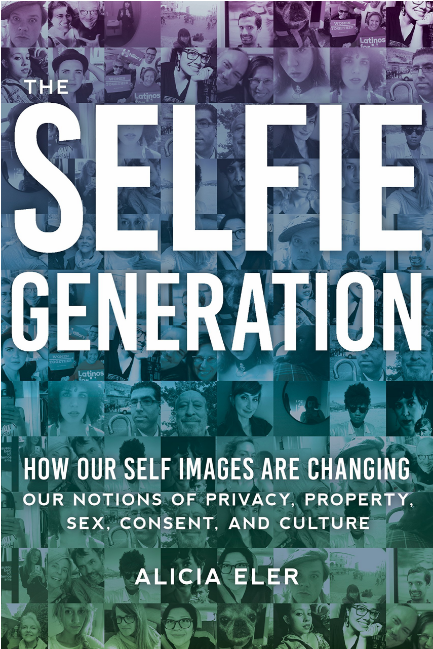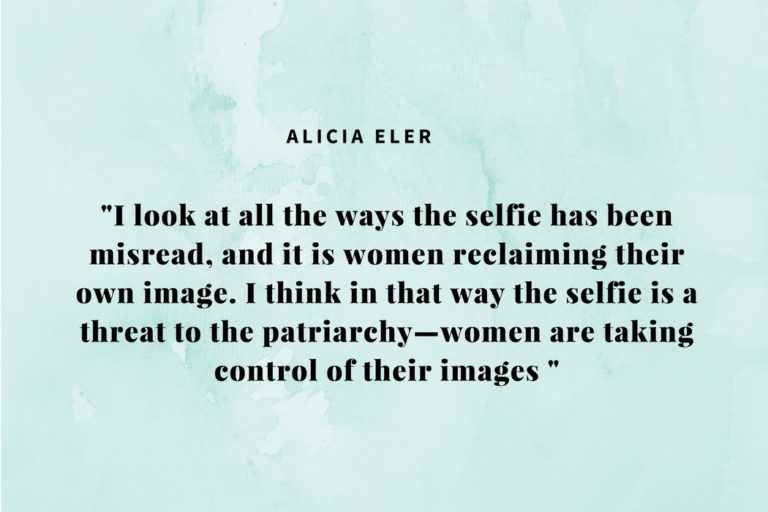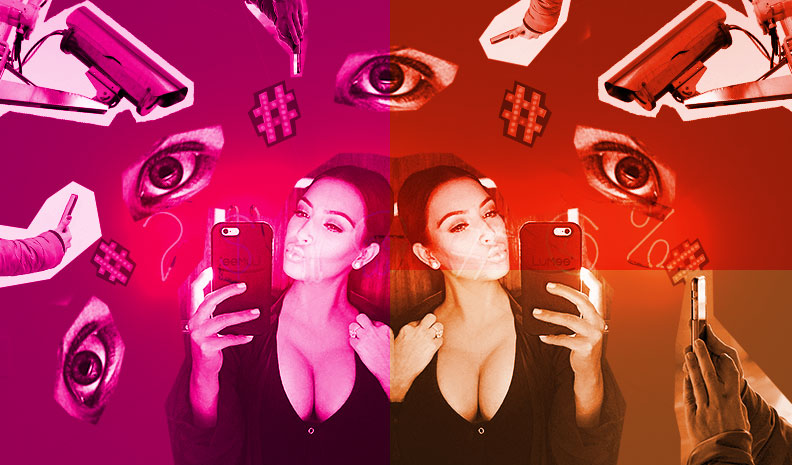Eler’s new book explores surveillance culture, branding and how selfies threaten patriarchy.
by Crystal Duan
Illustration by Grace Molteni
Alicia Eler is a selfie expert. In 2017 Wired called her the “selfie semiotician,” and earlier this year she released a book on the paradox of her expertise, “The Selfie Generation: How Our Self Images Are Changing Our Notions of Privacy, Sex, Consent, and Culture.”
In the era of #MeToo and other social movements that seek to empower, the selfie is one unexpected conduit for discussion. Criticism of the act of taking pictures of oneself seems to center on it being “narcissistic,” which can resound with patriarchal implications. Women are expected to behave in one way or another, and self-empowerment via selfie is not looked at favorably—even by other women.
Eler, 34, is currently the visual art critic at the Minneapolis Star Tribune and has written for publications such as The Guardian, Glamour, New York Magazine, CNN, LA Weekly and the Chicago Tribune. “The Selfie Generation” was birthed from a selfie column she wrote for arts publication Hyperallergic in 2013 when she crowd-sourced selfies from contributors and asked them to contextualize their thoughts and experiences about the images. After seeing how insightful the answers were, Eler continued the research that eventually culminated in the book.

Now she breaks down the complexity of the selfie by asking: Are selfies symptomatic of modern culture or part of the cause of it? She delves into examining phenomena such as adolescent identity formation and online privacy, while also bringing up points we all have to consider. Is it actually narcissistic to take a selfie? And at what point should we be redefining narcissism and the value of self-expression?
Crystal Duan: How did the inspiration for this book come along?
AE: As a teenanger in high school I took a lot of pictures of myself and a lot of that was trying to understand how people saw me and how I saw myself. I was really into photography in high school and it was something I did—I would take photos myself in my room, I would try on guys’ clothes and I’d be like, “How would I be read if I presented my gender differently?” So, I thought a lot about that.
And then in 2013 the selfie became a thing. Back then it was a new term, and there’d be these articles that would generalize about the selfie in a way I found problematic. So much of the writing about selfies tended to be people judging or condemning other people for posting selfies.
I thought, “Well, this is photographic form or genre… and you can’t generalize about one type of image entirely just because it fits into the category ‘selfie.’” I thought those articles were really reductive, and I decided to go on my own exploration in a column. Each week I’d provide analyses on selfie news of the week, and I’d ask for submissions, and a little bit about what the selfie meant to them and why they took it. Usually what the selfie takers would say about the selfie was vastly different from how it was [seen]. It’s seen as self involved, self-obsessed, but artists have been doing self-portraits forever. Does that mean they’re self-obsessed? Social media makes complex topics extremely polarizing.
CD: I’ve been thinking about how selfies are intimately tied with the patriarchy and how women are invariably belittled more for love of the self image. Do you believe all selfie criticism is equally abhorrent, or do you also see where there’s a point that people are being attention-seeking and narcissistic when they should be self reflecting and selfie-ing?
AE: Women are told how they look is more important than how men look, so then why wouldn’t we take more selfies? Anyone who selfies a lot can cross into being called attention seeking, but why is it so wrong to seek attention and validation?
I don’t see anything wrong with using selfies and stuff to get attention, but I think the thing that people freak out about is sometimes you don’t know the difference and it sort of becomes murky. Doing more of the self-searching work is harder.
I look at all the ways the selfie has been misread, and it is women reclaiming their own image. I think in that way the selfie is a threat to the patriarchy—women are taking control of their images and not needing some guy. It’s a microaggression when a group of women are taking a pic and some guy is like, “Ha, you want me to take your photo?” And a guy will feel upset he’s no longer needed if they can just take a selfie.

It’s a double-edged selfie sword on the other hand—people really need to make a decision for themselves and check in with how they’re feeling. But that act of “I’m going to do it myself”? That’s taking back the game.
CD: In response to it not being a bad thing to seek attention: What do you think is a more fair way of defining a narcissist, then, since we’ve come to accept that those who take selfies are not narcissists? In your book you also point out narcissists don’t necessarily have to even be taking selfies to be narcissists.
AE: I think it’s a reductionist argument to say, “All people who take selfies are narcissists.” That’s not true because when you look at what narcissistic personality disorder entails, I just don’t think there’s enough evidence to link everyone who has a phone this really extreme disorder. I think it’s like saying “Oh, watching TV makes you depressed.” Or is it actually that you already have depression and you happen to be watching a lot of TV?
CD: You also wrote about privacy concerns in your book. Do you think people taking selfies and voluntarily putting their face out there are in a sense protesting against the fact that our information is so up for grabs?
AE: That’s where the selfie is a contentious issue. It is symbolic of the fact that it can be read and used for facial recognition technology and how much of your info is out there either because you wanted it that way or because you just used the internet at all. I’ll buy something on Amazon, and I’ll get ads about it for a month. The selfie becomes symbolic of these concerns because it’s so visual and literal.
CD: The selfie has really taken off in terms of social movements, from mental health to #MeToo to even taking pictures at a news scene to make it seem more authentic. The function has changed a lot from the time you started writing the book in 2013. Where do you see the cultural significance of the selfie going next? Any theories?
AE: I think it’s going to move from selfie to virtual reality, A.I. and the cyborg manifesto becoming real life, especially—this is sort of dark but—as the earth becomes slowly more and more uninhabitable. On the flip side, I think people are getting sick of technology, and I think there’ll be a few moves to be without social media.
Back in the [19th century when postcards first emerged] there was a big moral outrage about [postcards] because people thought it would denigrate letter writing and people would write less. And there was a privacy concern because there’s nothing private about the postcard—anyone can just read it. People were really upset about it, and now no one thinks twice about a postcard. People were also upset about cellphones, and now it’s a normal thing. And I think with social media and with selfies, it’s still sort of in that phase where it’s this new thing that people are freaking out about.
Maybe people will soon realize they shouldn’t take a selfie on a cliff, but there’s always going to be outliers like that. People will always do those things and something bad happens. But I think a lot of the behaviors we’re taking with selfies are behaviors people were doing before. But now they’re just more visible.

Crystal Duan is a west coast-raised, midwest-bred writer based in Los Angeles. She has a weakness for Pad Se Ew, hot cheetos and philosophical memes. You can find her on Twitter probably posting about politics or her shameless love of Nickelback.
Grace Molteni is a Midwest born and raised designer, illustrator, and self-proclaimed bibliophile, currently calling Chicago home. She believes strongly in a “beer first, always, and only” rule, and is forever seeking the perfect dumpling. For more musings, work, or just to say hey check her out on Instagram.




